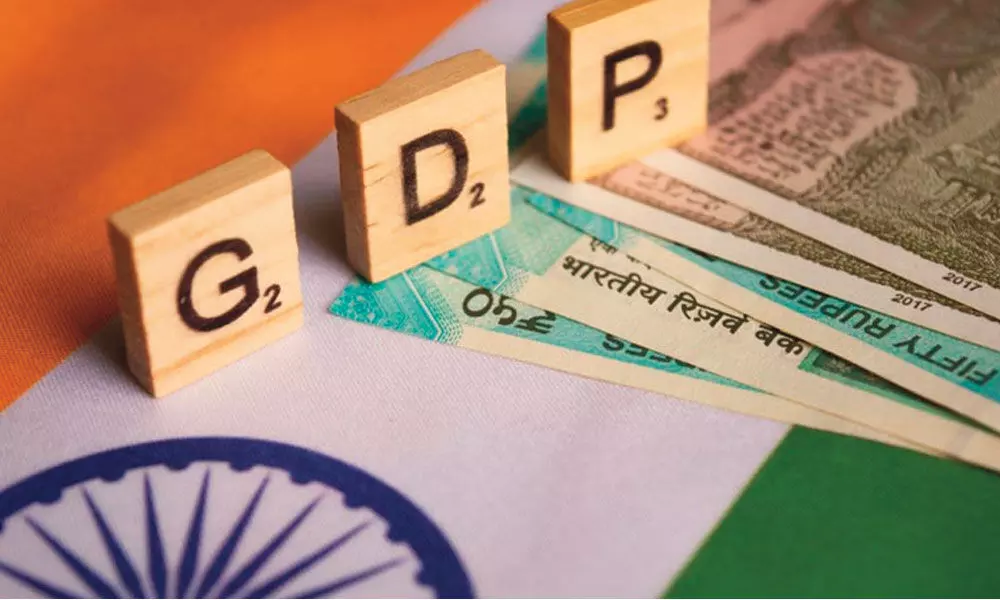Moody's slashes FY22 GDP forecast to 9.3%

GDP surges 20.1% in Q1 on low base
Global rating agency says 2nd wave will hamper economic recovery
New Delhi: MOODY's Investors Service on Tuesday slashed India's growth forecast for the current financial year to 9.3 per cent saying that the second wave of coronavirus infections hampers economic recovery and increases risk of longer-term scarring.
Moody's, which has a 'Baa3' rating on India with a negative outlook, said obstacles to economic growth, high debt and weak financial system constrain sovereign credit profile.
The US-based rating agency had in February forecast a 13.7 per cent economic growth for the current fiscal (April 2021-March 2022). As per official estimates, the Indian economy contracted 8 per cent in the previous fiscal ended March 2021.
"India is experiencing a severe second wave of coronavirus infections which will slow the near-term economic recovery and could weigh on longer-term growth dynamics. "The surge of the virus, which has been driven by a highly contagious variant, has put significant strain on India's healthcare system with hospitals overrun and medical supplies in short supply," Moody's said.
Stating that the second wave of coronavirus infections hampers economic recovery and increases risk of longer-term scarring, Moody's said the reimposition of lockdown measures will curb economic activity and could dampen market and consumer sentiment.
However, it does not expect the impact to be as severe as during the first wave. Unlike the first wave where lockdowns were applied nationwide for several months, the second wave 'micro-containment zone' measures are more localised, targeted and will likely be of shorter duration. Businesses and consumers have also grown more accustomed to operating under pandemic conditions.
"As of now, we expect the negative impact on economic output to be limited to the April-June quarter, followed by a strong rebound in the second half of the year. "As a result of the negative impact of the second wave, we have revised our real, inflation-adjusted GDP growth forecast down to 9.3 per cent from 13.7 per cent for fiscal 2021 and to 7.9 per cent from 6.2 per cent in fiscal 2022," Moody's said. Over the longer term, Moody's expects growth to be around 6 per cent.
"The credit profile of India is increasingly constrained by obstacles to economic growth, a high debt burden and weak financial system. Policymaking institutions have struggled to tackle and contain these risks, exacerbated by the coronavirus pandemic," it added.
It said mutually reinforcing risks from deeper stresses in the economy and financial system could lead to a more severe and prolonged erosion in fiscal strength, exerting further pressure on the credit profile.
India began the third phase of its vaccination campaign for those aged 18-44 on May 1, making the vaccination available to the entire adult population. However, as of early May only around 10 per cent of the country's population had received at least one dose of the vaccine.
"A shortage of vaccines and logistical difficulties in reaching a large rural population (about two-thirds of the population) complicate the vaccine roll-out," Moody's said. It added that the international community has recently contributed to India's vaccine efforts with increased medical and vaccine supplies to help address shortfalls.
"The spread of the virus and the rate of vaccinations will have a direct impact on economic outcomes." Moody's expects the renewed surge in the virus to contribute to a marginal shortfall in revenue and a redirection of spending toward healthcare and virus response relative to what the government budgeted in February.
It expects a wider general government fiscal deficit of about 11.8 per cent of GDP in current fiscal, compared with our previous forecast of 10.8 per cent.
"We expect the combined impact of slower growth and a wider deficit to drive the general government debt burden to 90 per cent of GDP in fiscal 2021 (April-March 2022), gradually rising to 92 per cent in fiscal 2023," Moody's said.








